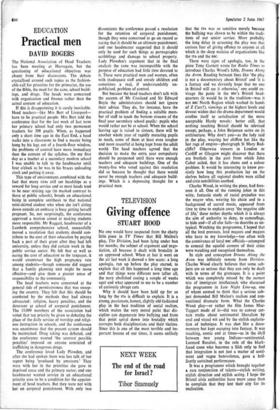Giving offence
TELEVISION STUART HOOD
No one would have suspected from the chatty little piece in TV Times that Bill Meilen's play, The Division, had been lying under ban for months, the subject of argument and nego- tiation, all because it dealt with brutality in an approved school. When at last it went on the air last week it showed a few scars: a long apologia, run up before the play started, to explain that all this happened a long time ago and that things were different now (after all, the navy abolished caning a couple of weeks ago) and what appeared to me to be a number of curiously abrupt cuts.
Why it should have been held up for so long by the ITA is difficult to explain. It is a strong, passionate, honest, slightly old-fashioned play in the best tradition of social realism, which makes the very moral point that dis- cipline can degenerate into bullying and from that point spiral down into brutality which corrupts both disciplinarians and their victims. Since this is one of the most terrible and im- portant lessons of our times, it seems unlikely that the rrA was so sensitive merely because the bullying was shown to be within the tradi- tions of our senior service. More probably the long delay in screening the play was that curious fear of giving offence to anyone at all which is the deep malaise of organisations like the ITA and the BBC.
There were signs of apologia, too, in the piece Tony Garnett wrote for Radio Times to introduce Charles Wood's fable, Drums Along the Avon. Reading between lines like 'the play is not a documentary about Bristol' and 'it is a fantasy and we devoutly hope that no one in Bristol will see it otherwise,' one could en- visage the panic in the ratc's Bristol head- quarters (it would be in the tradition—was it not BBC North Region which washed its hands of Z Cars?), viewings at the highest levels and devout wishes that the drama department would confine itself to serialisation of the more acceptable Hardy novels: better still, that nothing touching Bristol should be televised except, perhaps, a John Betjeman series on its architecture. Why don't you—as the lady said in the play, wearing her chiffon hat like the last rags of empire—photograph St Mary Red- cliffe? Otherwise viewers in London or Cardiff or Glasgow might discover that there are brothels in the port from which John Cabot sailed, that it has slums and a colour problem. It would be interesting to know pre- cisely how long this production lay on the shelves before all regional doubts were stilled and civic sensibilities soothed.
Charles Wood, in writing the piece, had fore- seen it all. One of the running jokes in this witty, fantastic study of racial prejudice was the mayor who, wearing his chain and to a background of sacred music, appeared from time to time to explain away 'the negative side of life,' those nether depths which it is always the aim of authority to deny, to camouflage, to hide and—if all else fails—to describe as un- typical. Watching the programme, I hoped that all the lord provosts, lord mayors and mayors who have to my knowledge—too often with the connivance of local BBC officials—attempted to conceal the squalid corners of their cities were watching and recognised themselves.
In style and conception Drums Along the Avon was infinitely remote from Division. Charles Wood clearly believes that some sub- jects are so serious that they can only be dealt with in terms of the grotesque. It is a point which was completely missed by the earnest trio of immigrant intellectuals who discussed the programme in Late Night Line-up, one of whom seemed to think that a serious sub- ject demanded Bill Meilen's realism and con- ventional dramatic form. What the Charles Wood play—or rather the film James Mac- Taggart made of it—did was to convey cer- tain truths about sentimental liberalism by oral and visual wit and by the stylish exploita- tion of technique. It was shot like a docu- mentary but kept escaping into fantasy. It was touching, comic and at times—as in the idyll between two young Indians—sentimental. Leonard Rossiter, in the role of the black- faced coon who becomes a Sikh only to find that integration is not just a matter of senti- ment and vague benevolence, gave a bril- liantly sustained performance.
It was a programme which brought together a rare conjunction of talents—stylish writing, stylish direction and stylish acting. I hope the Bristol civic authorities have more sense than to complain that they lent their city for its realisation.


































 Previous page
Previous page